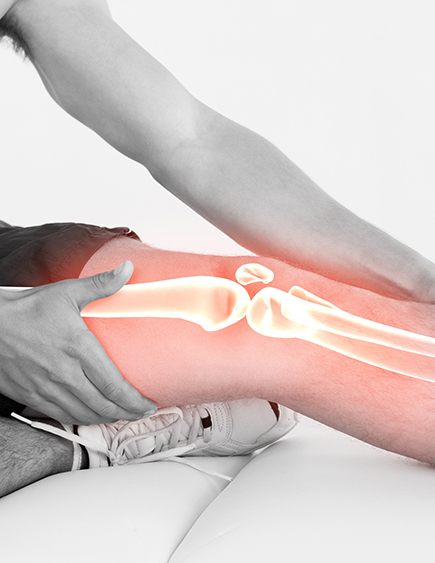What is Tendonitis in the Knee?
Tendons and Tendonitis
Your tendons serve a critical purpose by connecting muscles to bones. When you move your muscles, tendons ensure your bones move as well. Together, muscles, tendons, and bones make it possible for people to do just about anything – walking, running, and lifting are only the beginning.
Tendons are tough but flexible. The are strong enough to keep your body moving, and supple enough to make those movements smooth, graceful, and comfortable. Unfortunately, tendons can become inflamed. When they do, you experience the pain of tendonitis.
You may be asking, what is tendonitis in the knee? It’s a good question, because your knees are particularly susceptible to this condition. Knee joints work hard every day, and you count on them for almost everything you do.
Your knees rely on several large tendons to function properly, and when any of these become inflamed, you feel pain. Exercising is uncomfortable, and even the simple act of walking may be difficult. Fortunately, a top pain doctor near you can evaluate your tendonitits and get you moving again pain free.

What Are The Symptoms of Knee Tendonitis?
The most common sign of knee tendonitis is pain when you move the muscles around the knee. Often, symptoms begin with mild discomfort that gets more severe over time. However, the condition doesn’t always develop gradually. Some patients report a sudden onset of terrible knee pain.
Inflammation may also bring swelling, which adds to difficulties with movement. As the condition worsens, you might find walking, running, and going up or down stairs completely unmanageable. Following are the symptoms of tendinitis in the knee:
- Pain around the kneecap region.
- Swelling and inflammation at the affected area.
- pain that gets triggered by certain movements.
- Sharp sudden pain even when you are resting.
Who is at Risk for Tendonitis in the Knee?
Some of the risk factors for knee tendonitis are outside of your control. Examples include tight leg muscles, misaligned feet, ankles, and legs, or uneven leg muscle strength. Some patients have chronic diseases that cause weakness in tendons. For others, obesity is a contributing issue.
Other factors are related to your lifestyle. Wearing shoes that don’t have appropriate padding and playing sports on hard surfaces are both hard on the tendons in your knees.
Many patients develop knee tendonitis because they overuse the joint. Doing the same type of exercise for a long period of time results in repeated stretching of the tendons. All of this stretching causes tiny tears in the tendons, making them much weaker. This leads to inflammation and the subsequent pain of tendonitis. You are prone to tendonitis knee if you have:
- 40+ age
- Low bone density
- Trauma near the knee area
- Muscular imbalance
- Overuse of tendons
- Rheumatoid arthritis
- Diabetes
Runners often fall victim to tendonitis, because this type of exercise requires repeated movement over long periods of time. In addition, when you run, your knees experience force of up to five times your body weight.
It is possible to strain your tendons by doing a lot of exercise in a short amount of time. For example, some patients are too busy to work out during the week, so they overexert themselves over the weekend. The older you get, the more likely you are to face tendonitis, because tendons become more brittle as you age.
Other risk factors for tendonitis include participating in sports and activities that require repetitive jumping. Basketball and volleyball players fall into this category, and some people develop tendonitis after spending too much time at one of the many trampoline parks that have become popular in recent years.
This type of tendonitis is sometimes known as “jumper’s knee”, because it tends to affect a specific part of the knee joint. Repetitive jumping may put too much strain on the patellar tendon, which connects the kneecap to the shinbone. (The formal term for kneecap is patella.) When you have раtеllаr tendonitis, you feel pain at the front of the knee, just below the kneecap.

How You Can Prevent Tendonitis Knee?
To lessen the impact of patellar tendinitis, take these steps:
- Don’t overuse the joint in pain. If you are going through exercise-related knee pain, use the compression technique and rest. Until you feel at ease, avoid activities that cause more pain.
- Train your core muscles. Strong thigh muscles manage the stresses that can cause patellar tendinitis. Core exercises, which consist of lowering your leg very slowly after extending your knee can help.
- Improve your workout position. Stay in the correct position, consider taking lessons or getting professional instructions when trying new positions.
What are the common options for treating tendonitis in the knee?
Mild cases of tendonitis may not require a visit to your pain treatment clinic. There are a few things you can try at home:
- Rest and avoid the activity that led to your tendonitis. For example, take a break from running and stay away from sports that require a lot of jumping.
- Apply ice packs to bring the swelling in your knee down. Do at least two 15-minute sessions per day.
- Elevate your knee so that it is higher than your heart. This improves blood flow to the area and helps with reduction of swelling.
- Use an elastic knee bandage to reduce swelling and pain.
- Try over-the-counter anti-inflammatory pain relievers such as ibuprofen and naproxen. However, this comes with caveat. If your case is mild, these pain relievers may completely resolve your pain, giving you the false impression that you are ready to return to running and other activities that stress your tendons. Don’t make the mistake of jumping back in too soon.
It can take up to six weeks for a full recovery from knee tendonitis, and it is important that you continue to be gentle with your joints during this period. Once you are completely healed, return to your normal activities gradually to ensure you don’t have a relapse.
What Should I Do if Home Remedies Don’t Work?
Home remedies don’t always provide a permanent solution for tendonitis. If your case is persistent, chronic, or giving you more than mild discomfort, it is time to see a pain doctor or a knee pain specialist.
A variety of physicians treat tendonitis, including your primary care physician, but a specialized knee pain doctor is the best choice. These experts ensure you get an accurate diagnosis and medical advice that relies on the most current treatment options available.
During your initial exam, your pain doctor may order some tests. In some cases, an x-ray is appropriate to rule out a fracture or displacement of the kneecap. An MRI or an ultrasound may also be appropriate, so your doctor can see any damage to your soft tissue.
Your pain doctor may recommend physical therapy to stretch and strengthen your tendons. If your pain is so severe that it is limiting your ability to manage daily activities like walking and driving, a medical injection or other treatment may be the right solution.
Learn more about what tendonitis in the knee is and how it is treated by visiting your pain treatment specialist. At our Pain Center, we offer minimally invasive treatments for your knee pain, without unnecessary medication or downtime. We also offer same/next day appointments, making sure you don’t have to suffer unnecessarily.
Book a Consultation
Scheduling a consultation with one of our pain treatment specialists is one of the best ways to determine the proper solution for pain relief.



















